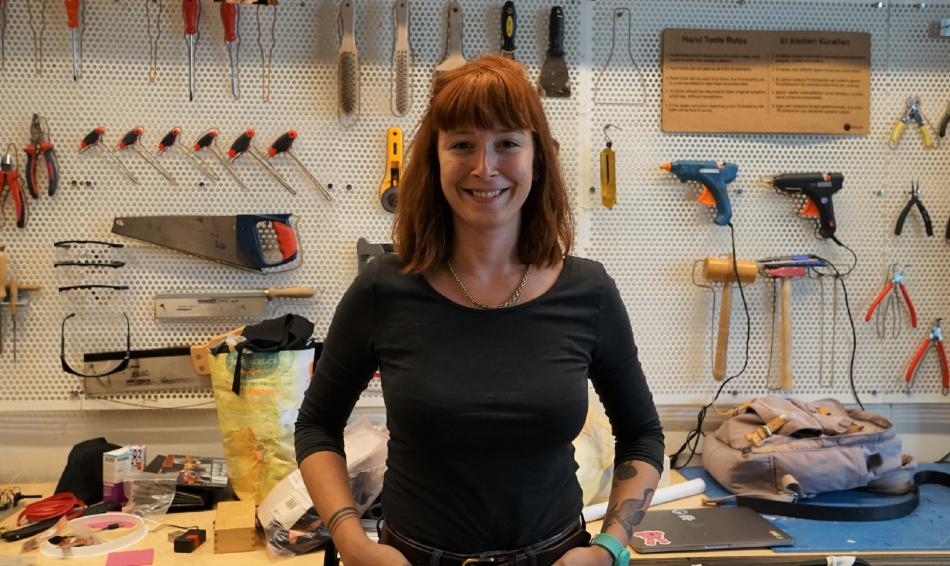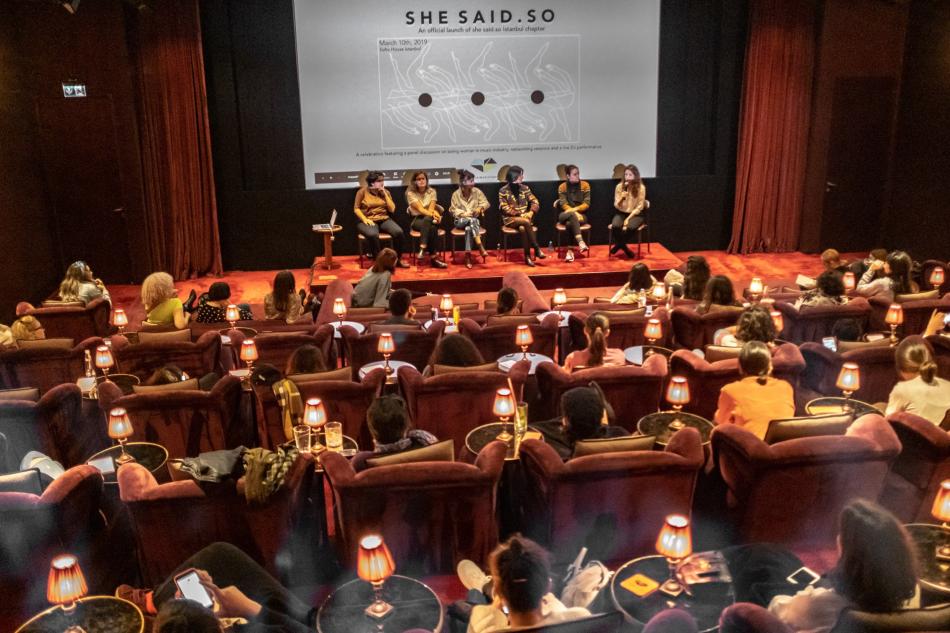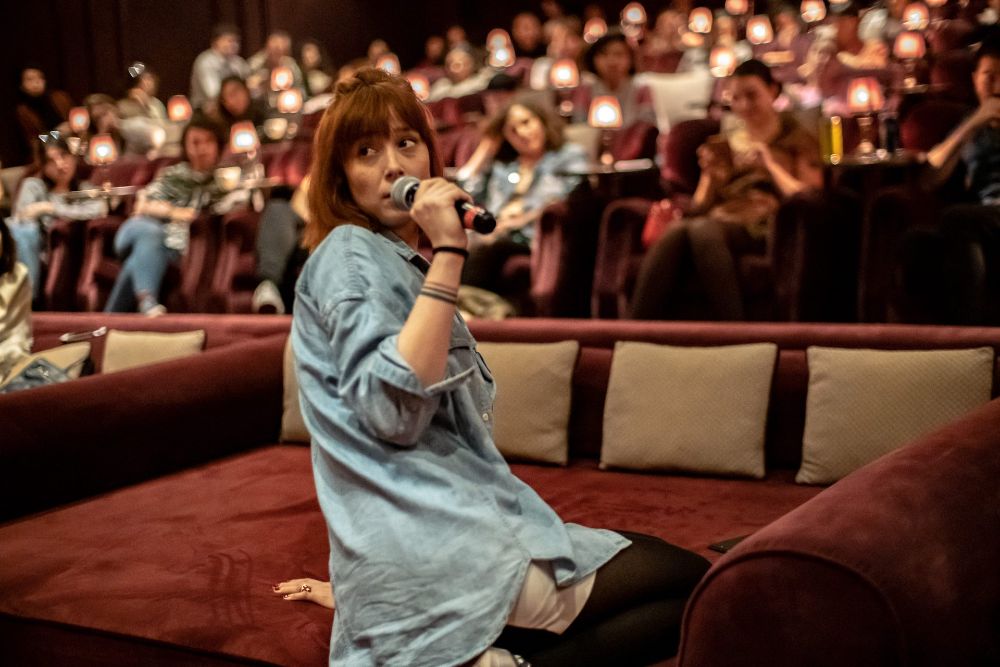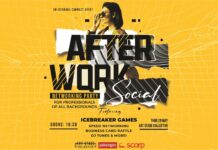To the outside observer, Istanbul’s arts and culture scene is a thriving, cosmopolitan blend of offerings for those willing to make the most of their time here. Behind the scenes however, a closer look reveals social and political challenges which can be difficult for both organizers and artists alike to navigate. Finely tuned into this industry and its various complexities is Gülşah Görücü, a sociologist boasting two Masters and an evident penchant for academia, who has meanwhile dedicated the majority of her professional career to the country’s music sector and now aims to support the women within it. Gülşah’s devotion to the world of music is unmistakable, having committed her career to writing, interviewing and critiquing for multiple publications, booking and promotion, consulting on various arts and culture programs, radio programming, DJing, and more. In co-founding Istanbul’s shesaid.so chapter, she has harnessed her firsthand experiences and her extensive network in a way that offers a meaningful contribution to the music community that brought her here and aims to connect women from across the entire industry to a global network. In much the same way, she also leads the charge in bringing the members of ATÖLYE together as their Community Coordinator and provides a sense of belonging for those of us here.
We took some time to speak with Gülşah about the state of Turkey’s music industry, the roles of and challenges facing women in the sector, the balancing act of pursuing one’s academic pursuits alongside one’s passions, and what’s next for this advocate of the country’s ever-changing arts and culture landscape.

Could you start off by telling us a little bit about yourself?
I was born in Izmir in 1990. For a long time I was studying philosophy and sociology. I received a scholarship and started to study sociology at Bilgi University, but after two years it started to feel like sociology was telling me that everything is really bad: Life is bad. Business life is bad. Family issues are hard, and so on. So I wanted to create a different perspective for myself. I applied for a double major in advertising and it was the worst mistake I’ve ever made. I did the double major, but while listening to things about how life is hard, capitalism is bad, and so on through sociology, advertising was telling me capitalism is great, you can sell the brands and products, and so forth. I felt I was in the middle of these two opposing views.
Then, at that time, I started to do an internship at Radyo Eksen. It was my first involvement in the music industry. I was working as a content editor, and preparing the nightly playlists. I got a scholarship to the University of Amsterdam shortly after and moved there, right around the time of the Gezi Park protests.
Meanwhile, I was also working in a sociology and education unit founded at Bilgi University. We were trying to find a middle way to do Kurdish and Turkish education together. We were hoping to find a solution, but couldn’t find one, but the unit is still working on it today. The peace process was cancelled after Gezi and that was the same time I left for Amsterdam. I was also working for Agos, an Armenian newspaper, as a music writer.
What was your focus at the University of Amsterdam?
It was a research Master’s on Urban Studies. It was interdisciplinary and very quantitative. I studied sociology in a qualitative way, and I believe that understanding society can only happen through mixed methods or qualitative methods. Quantitative was not a good match for me in an academic sense. I began discussing with my friends and teachers, and it was a bad time. They didn’t feel that interviews were sufficient and encouraged me to get data from municipalities, environments, etc. and put them in an excel document and so forth.
I didn’t believe there was a need to do this. While I was there I was also working for Açık Radyo and some newspapers in Turkey – but of course writing in Turkey is something you don’t usually get money for. So when I was there I had dropped it.
When I returned to Istanbul, I started writing again about music, festivals, concerts, and so on. I attended many festivals for many local newspapers. I was also writing for XOXO Magazine for a long time. I interviewed with artists and musicians and so on.
I then directly started working for Universal Music. I was doing marketing and also responsible for Spotify advertising. If you’ve used Spotify for free here, you’ve probably heard my voice. [Laughter.]
Is this before working with Zorlu?
Yes, so in late 2016 I got a job at Zorlu Performing Arts Center. In three years, I was involved with 1,500 concerts in the contemporary music line. I also worked on three festivals, helped start Sonar Istanbul, and worked on MIX Festival and Zorlu PSM Jazz Festival. 2015 and 2016 were actually difficult times – full of blood and terrorist attacks. Every offer we sent received responses concerned with the security of Turkey. It was one of the hardest times in my career. For two years, my whole career was shaped by Turkey’s political issues.
On a positive side though, at that time, it was really hard for our audience to have a place to feel they’re having fun. I mean in the city we only have Küçükçiftlik Park for outdoor spaces. If you want to attend a festival, you have to go to the outskirts of the city. The arts and culture scene has been cleaned out from Istanbul basically. So at that time, we felt we were doing something good for people.
Zorlu PSM survived that period and at the very beginning of this year I got a job offer from ATÖLYE, so I changed my whole career path. I had been working in culture and arts since 2007 and this is a new, cool change. It’s a time of pause for me now. There’s time to talk to people, you can discuss breakfast, and so on. At Zorlu PSM there was no time for small talk.

Your educational background seems so different from your involvement in the music sector. How did you end up pursuing a career in this field?
It all started from my time at Radyo Eksen. I realized that studying sociology was giving me a vision to understand the people around me, the life around me, and the history of our country and world history. At the same time though, if you are living in Turkey and tell people you are studying sociology, people are like, ‘Oh, you must be a psychologist,’ without really understanding that I’m a sociologist.
I had always tried to stay in academia. It’s why I did two Masters and why I’m still trying to find a proper PhD program. I’m a sociologist for sure, but I always felt more comfortable working in the music industry. If I had stayed in academia or worked in blue collar health issues, it wouldn’t be the right path for me.
I need a reaction. At a concert, you can look at the audience and see if they like it or not. Getting that instant reaction is important for me. Also, all my friends and my entire network is in this industry. It’s a pool, with everyone swimming and hanging around, and it’s still the same people working.
You’ve implied that coming here is a career shift to an extent, but it’s clear you’re also still involved in the music sector. Could you tell us a bit about shesaid.so Istanbul and how you’ve managed to balance that with your current work?
When joining ATÖLYE, we sat down together and I mentioned that I can’t lose my contacts and network. The arts and culture scene can forget you very quickly. It was my threshold to work here. I made a promise that I’d work here with all my focus and energy, but at the same time I should have my own time. They’ve understood totally and I really appreciate their support.
For the last ten years I’ve worked for many companies and I had been planning to do something for myself. At the end of the day it isn’t your thing, it’s their thing. I realized I really would like to reach out and touch people and do it under my name. One night, one of my old friends Melis Nots called me after we’d both had a few drinks. [Laughter.] She suggested that we do an event for shesaid.so on the 8th of March for International Women’s Day.
The plan at the beginning was to do an event and introduce shesaid.so and the work they’re doing. After a few more drinks, we realized we could start an Istanbul chapter if it was OK for the global team. We had some conversations with the global team. Andreea, their founder, is Romanian and living in Los Angeles. She told us how the music industry is currently for men and white women. She wanted to focus on black women – not just in terms of race, but in discrimination and other aspects as well. They received support from Georgia – one of the most important women in the global music industry. After speaking with both of them, we decided to open a chapter for shesaid.so in Istanbul. They have a chapter in Mumbai, they have a chapter in the East, but putting Istanbul in context is different for them.
First we had conversations with the team, because they are doing a lot in London. Their main team is working in London right now. Eight people are working for shesaid.so. All the other chapters operate voluntarily, so there’s no financial issues between us. They told us to do an event and let’s see the outcome. We should see the audience reflection. Lauren from their Barcelona chapter came to Istanbul for it. We did our first event at Soho House on March 10th, with Red Bull as a sponsor. We invited almost 250 women working locally in the industry. We got a positive answer from 200 people, but the space only permitted 110 people. Some men also expressed an interest in joining, but this was an event focused on women. It went really well!
Somehow the event changed while it was happening. It became a type of group therapy. Women started telling about the discrimination they face, the violence from men, and so on. Some cried, some laughed, it was a really unexpected atmosphere. We realized the first thing we have to do is get to know each other. All these women are working in the music industry and we don’t know who they are, we’ve never met, etc. So the strategy at first became based on this. For three months, until the end of June, our aim was to do events focused on talking, understanding their needs, and understanding who we are in the music industry. We’re realizing just how many women are in the music industry and under the bigger umbrella of culture and arts as well. Some of the highest levels are being run by women here, like IKSV and Pozitif. Sorry but we could not include Zorlu PSM in it. We learned that there are many women in power in Istanbul’s music industry.
What’s currently happening with the platform?
We were recently invited to give a talk at Ibiza’s international music summit. Melis, my co-chair, went and gave a presentation on intersectionality in the music industry. Through that, the global scene began to learn there’s a shesaid.so chapter in Istanbul. Now the strategy is to collaborate with all the venues and artist teams and bring women who haven’t been to Turkey to come give a concert. The global strategy also has us doing mindfulness sessions and therapy sessions. We are still looking for venues. The next event will focus on women’s issues in the industry, then we’ll do a yoga or mindfulness session. We’ll book a female artist and pay them to perform. We have only one red line, which is that while we’re doing our events, with all our hearts, we want to pay the artist. That’s why the support from Red Bull in the first event was really important. It’s how we were able to invite Lauren and pay for her flight and accommodation. We want to put this understanding in the culture and arts scene here. It’s the most important initiative we can take, because artists in the music industry in Turkey are not paid fairly.
We know you recently hosted an event here, Modern Communities, and spend much of your time working here. How does ATÖLYE fit in?
The ATÖLYE community is what I needed. There are people from A to Z, from the creative industries to engineering. The funny part is you might think you’re working in the music industry, but at ATÖLYE you can also find yourself collaborating with an engineer who has something valuable to offer on your project. It’s really opened my perspective, as well as expanding my network. There are lots of creative people in the industry of course, but I realized I was stuck only in the arts and culture scene.
Also of course the event space is great. I curated and moderated Modern Communities for example, but it was the project of ATÖLYE actually. Emre designed the night. It was a great opportunity to have members of other communities come here. Bisikletli Kadın İnisiyatifi and Girl Gone International for example. The conversation we had with the attendees was really cool. I started the conversation by asking them questions, with the first being, “What is the first community you’ve been a part of?” Half the audience said it was online communities, like a Harry Potter book Facebook page for example. We really understood that times have changed, you can be part of both online and offline communities.
How much of what you’re doing with shesaid.so is in English or could be accessible to foreign women in Turkey?
Actually, putting English information on every event we have is a rule. It should all be in both in English and Turkish. We use a lot of English.

For example, if a woman came from abroad and had a background in music, but maybe isn’t involved in the local industry here, could she somehow become involved?
Yes, there is. We are starting to plan mentoring sessions for September. It’s gonna be shaped like this. In our minds we are thinking to create a talent pool with the seniors of the industry and for juniors in the industry, both internationals and locals – everyone is welcome. The mentoring sessions will last something like six to eight weeks and we’ll give some topics to discuss, starting from how to find a proper job in Turkey, to more detailed topics like putting together concerts. They do the same thing in the global chapter and in that way, we can also invite more of an international audience.
Anything on the horizon that you’re looking forward to?
On a personal note, I’m still digging to find the right PhD program for me. We’ll see what happens. Nowadays I’m going with the wind it seems. For now I’m having fun and dealing with what’s on the table.
To conclude, any final words for foreigners who are living here in Turkey?
I suppose they should go to Beyoğlu more. It is changing so much and once Galata Port is finished, I believe all the alternative places will go back to Asmalı Mescit. 2007 there was like a dream. Maybe with this interview, we can encourage people to start going there again.
To keep up with Gülşah and her work, check out the official website for shesaid.so and be sure to follow the Istanbul chapter via Facebook and Instagram. You can also follow her personal Instagram.
ATÖLYE Spotlight is our series on the inspiring community members of Istanbul’s most creative space.
Images courtesy of the interviewee and Joris van Gennip.









